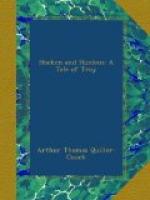This Mr Peter Benny—father of Mr Shake Benny, whose acquaintance we have already made—was a white-haired little man who had known many cares in life, but had preserved through them all a passionate devotion to literature and an entirely simple heart: and these two had made life romantic for him, albeit his cares had been the very ordinary ones of a poor clerk with a long family of boys and girls, all of whom—his wife aiding—he had brought up to fear the Lord and seen fairly started in life. Towards the close of the struggle Fortune had chosen to smile, rewarding him with the stewardship of Damelioc, an estate lying beside the river some miles above Troy. This was a fine exchange against a beggarly clerkship, even for a man so honest as Peter Benny. But he did not hold it long. On the death of his wife, which happened in the fifth year of their prosperity, he had chosen to retire on a small pension, to inhabit again (but alone) the waterside cottage which in old days the children had filled to overflowing, and to potter at literary composition in the wooden outhouse where he had been used, after office hours, to eke out his 52 pounds salary by composing letters for seamen.
He retained his methodical habits, and Cai found him already at work in the outhouse, and thoroughly enjoying a task which might have daunted one of less boyish confidence. He was, in fact, recasting the ‘Fasti’ of Ovid into English verse, using for that purpose a spirited, if literal, prose translation (published by Mr Bohn) in default of the original, from which his ignorance of the Latin language precluded him. For a taste:—
“What sea, what land,
knows not Arion’s fame!
The rivers by his song were
turned as stiff as glass:
The hungry wolf stood still,
the lamb did much the same—
Pursuing and pursued, producing
an impasse—”
But while delighting in this labour, Mr Benny was at any time ready, nay eager, for a chat. At Cai’s entrance he pushed up his spectacles and beamed.
“Ah, good morning, Captain Hocken!—Good morning! I take this as really friendly. . . . You find me wooing the Muses as usual; up and early. Some authors, sir,—not that I dare claim that title,—have found their best inspirations by the midnight oil, even in the small hours. Edgar Allan Poe—an irregular genius—you are acquainted with his ‘Raven,’ sir?—”
“His what?”
“His ‘Raven’; a poem about a bird that perched itself upon a bust and kept saying ‘Nevermore,’ like a parrot.”
Cai winced. “On a bust, did you say? Whose bust?”
“A bust of Pallas, sir, in the alleged possession of Mr Poe himself: Pallas being otherwise Minerva, the goddess of Wisdom, usually represented with an Owl.”
“I don’t know much about birds,” confessed Cai, reduced to helplessness by this erudition. “And I don’t know anything about poetry, more’s the pity—having been caught young and apprenticed to the sea.”




